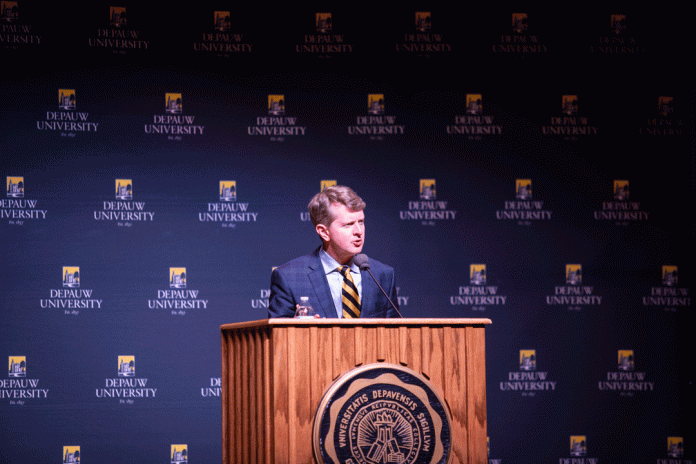
Who would have thought a La-Z-Boy couch and a Fisher-Price children’s toy were critical components of Ken Jennings’s status as “Jeopardy!” GOAT?
Preparation was one of three components to success that Jennings talked about during his Ubben lecture last night. Jennings exemplified his training for “Jeopardy!” by recalling the times he would watch the show and answer questions while standing behind his La-Z-Boy, which acted as a podium and using his child’s Fisher-Price toy as a makeshift buzzer.
Although Jennings recalled his preparation tactics, he said nothing compares to being a contestant on “Jeopardy!”. “There is nothing to prepare you for how fast-paced Jeopardy feels when you’re actually behind the podium,” Jennings said.
The Jeopardy GOAT also discussed how difficult it is to prepare for the game show. Considering the questions can be about a wide variety of topics, Jennings said there is no way to cram. “The way to prepare is not to study up on what but to study up on how,” Jennings said.
Jennings often gets asked, “how do you know all this stuff?” to which he says there is no secret, but that those who succeed on Jeopardy pay attention to everything. “Jeopardy people don’t think like that; they are omnivores when it comes to information. They believe everything is a little bit interesting, and that is the only secret.”
His hunger to learn led Jennings to transition to his second point of success: curiosity. Jennings said that in the age of Siri, Alexa and Google, our questions can be answered instantly, which makes us more likely to look things up on our devices rather than simply remember facts. With this, Jennings posed the question, “Do we even value the stuff we know anymore?”
Jennings answered his own question by explaining the social utility of things we know. It is easier to start a conversation if you know a bit about multiple topics. He furthered this point by emphasizing the importance of being a “generalist” and knowing a bit about everything.
“If you could find a way to convince yourself that everything was equally interesting instead of putting yourself in these little silos of specialization, you would immediately unlock this magical power to remember anything,” Jennings said.
The final component of Jennings’s success was luck. “Luck is extremely important on Jeopardy,” Jennings said.
From the difficulty level of the questions to hitting the buzzer at the right second, luck was a critical part of Jennings’s success.
Jennings also talked about his luck outside the realm of Jeopardy, in terms of privilege. “I’m speaking of a very specific kind of Jeopardy privilege,” Jennings said. “I grew up in a way that I had an educational advantage where all these things were super easy for me, and I never had to think about it because that’s the definition of privilege.”
Following his three main components of success, Jennings encouraged the audience to pursue the things they love, whether that is as a career or simply as a hobby. “There’s ways to make your talents and your passions part of your lives without assuming that they are the thing you need for your livelihood,” Jennings said. “Obsession is destiny; do not neglect that.”
Although Jennings gave the audience his components of success, he said the real secret is to always be curious. “Learning is an absolute good, that we are, all of us, the sum of the things that we learn, that’s what makes us, people. That’s what makes you, you, is the things in your head,” Jennings said.
With the secret of curiosity, Jennings left the audience with a final challenge, which encouraged the task of learning something new every day.
Jennings said, “Will you try to learn something new every day? Will you think about that? Live your lives in the form of a question. That is my challenge to you.”
Reactions to Jennings’s lecture were positive, as he left many inspired and curious. “Especially for students at a liberal arts college, [he] inspir[ed] us to be curious and to never stop learning,” Junior Emma Werkowski said. “I think it’s really important, what he said about continuing on, to always pursue knowledge and want to know [more].”
Some were surprised by Jennings’ humor and discussion surrounding privilege. “I was surprised by how funny he was; I guess I was not expecting that,” Kate Grimm, Event Production Coordinator, said. “I really liked how he defined privilege, I thought it was a great way to speak to the community in attendance and equating it to luck and what his background was and how that was privilege was a really smart way of doing it without alienating anyone.”
Scott Thede, Chair of the Computer Science Department, said Jennings was relatable and easy to talk to. “I liked the part about how winning is doing the thing that you want to do and that you are passionate about, I thought that spoke to me,” Thede said.
Individuals also expressed their gratitude for the Ubben lecture series as a whole. Leslie Smith, Executive Director of Alumni Engagement, said she appreciates the Ubben lecture series and how it brings diverse perspectives to campus. Smith expanded on the diversity Ubben lectures bring to campus, “Different industries, different experiences, different life trajectories,” Smith said. “I just really think that with us being a liberal arts institution, this is one way that we can actually bring the classroom to life.”
